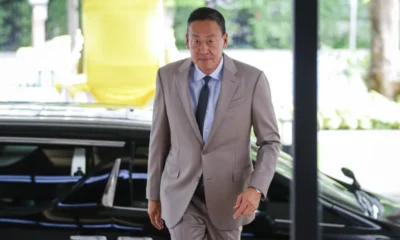Connect with us
Published
11 months agoon

As Oregon celebrated the 50th anniversary of decriminalizing cannabis in the state, Rep. Earl Blumenauer (D) used his time during a floor speech on June 23 to highlight the gaps in progress we still need to fill within the broader cannabis industry, Benzinga reports.
Blumenauer, co-founder and co-chair of the Congressional Cannabis Caucus, said he was honored to be part of the process of Oregon’s cannabis decriminalization back in the early ‘70s, though he used the platform to issue a challenge, saying, “It’s time for the federal government to catch up.”
Blumenauer continued, highlighting the different groups who face hardships due to the continued lack of cannabis action on a federal level.
“We owe it to the generations of Black Americans targeted by the failed war on drugs,” Blumenauer added. “We owe it to our veterans, with their wounds seen and unseen. We owe it to thousands of workers and their employers who fail drug tests every day because they used state-legal cannabis weeks before. We owe it to the large and growing cannabis industry, whose employees are targets for violent robbery because we deny them bank accounts. We owe it to the American public who are not waiting for the federal government.”
Blumenauer has also been hard at work to push progress within the legal cannabis industry. The representative reintroduced the Small Business Tax Equity Act in April, which would amend an IRS code and allow state-legal cannabis businesses to take federal tax deductions and provide relief to cannabis businesses struggling with the burdens of high taxes.
Under the current 280E code, any company involved in the trafficking of controlled substances, including cannabis, is denied deductions and credits. At a virtual media event in April discussing recent developments in cannabis policy, Blumenauer said the current rule is a “major area of discrimination” and “hopelessly unfair” against those in the cannabis industry. At the time, he also urged the federal government to get with the times on cannabis policy.
Along with 15 other bipartisan members of Congress, Blumenauer also led a letter to the U.S. Department of Health and Human Services (HHS) Secretary Xavier Becerra and Attorney General Merrick Garland in March, demanding transparency in the cannabis scheduling review by the Biden administration.
The letter stated that the administration’s scheduling directive provides an “opportunity to make an honest assessment of the origins and implications of federal policy,” adding that the initial scheduling of cannabis was based on stigma instead of science, once again adding that now is the time to address cannabis on a federal level.
“We need that framework to tax and regulate cannabis,” Blumenauer concluded during his speech last week. “On the anniversary of Oregon’s historic step to decriminalize cannabis, it’s past time for the federal government to be a real partner—and not a roadblock—on the path forward.”
The newly formed Coalition for Cannabis Scheduling Reform (CCSR) launched earlier this month and published a report on Monday outlining the considerations surrounding the scheduling review. The report is meant to illustrate the benefits of an incremental change, moving cannabis from Schedule I of the Controlled Substances Act to Schedules III-V, though the coalition is still pushing for complete descheduling.
The U.S. Department of Health and Human Services must first complete an eight-factor scientific review into cannabis and submit its findings and recommendations to the Justice Department. The Drug Enforcement Administration (DEA) would then have the final say on a scheduling determination.
The report shares a number of key arguments: that full descheduling would achieve the most progress possible from this review; that rescheduling cannabis to Schedules III, IV or V work be a historic step to comprehensive cannabis reform, that the executive branch can meaningfully accomplish reform through this process without upsetting existing standards for scheduling; the “low-abuse potential” of cannabis confirms that descheduling or rescheduling cannabis to Schedules III-V is most appropriate; and that U.S. international treaty obligations should not interfere with the executive branch’s descheduling or rescheduling of cannabis.


Thailand Prime Minister Aims To Re-List Cannabis as Narcotic By End of 2024


Hemp-Based Food Market to Soar to Over $8B by 2029, Report Forecasts


Vermont House Representatives Pass Psychedelic-Assisted Therapy Working Group Bill


Senator Cory Booker Visits Sacramento Cannabis Giant Amid Decriminalization Push


Illinois Hemp Operators Call For Regulation Instead of Prohibition


Signatures for South Dakota Adult-Use Cannabis Initiative Submitted
